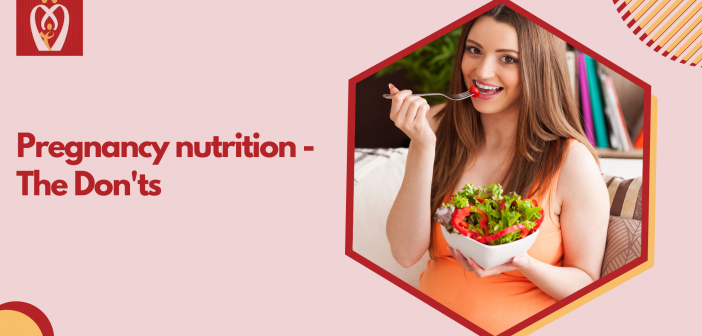The first thing a pregnant woman learns is what she should and should not consume during pregnancy. Those who enjoy sushi, coffee, or a rare steak may be particularly disappointed as these are some of the foods to avoid during pregnancy.
Fortunately, what you can consume outweighs what you cannot. Maintaining a healthy pregnancy will require you to keep an eye on what you eat and drink. Occasionally eating some foods is a good idea, while others should be avoided completely.
Foods to avoid during pregnancy
1. Fishes high in mercury
Mercury is a highly poisonous substance. Toxic levels are unknown and are found in polluted water the most frequently. It can harm your neurological system, immunological system, and kidneys if consumed in large quantities. If you’re concerned about your child’s growth, it’s one of the foods to avoid. Mercury accumulates in huge marine fish because it is found in polluted environments. Mercury-containing fish should therefore not be eaten by pregnant or nursing women.
Pregnant women are advised not to consume any of the following:
- Bigeye tuna
- King mackerel
- Marlin
- Orange roughy
- Swordfish
- Shark
- Tilefish
2. Seafood that has been undercooked or is raw
To prevent the spread of dangerous bacteria and viruses in seafood, some foods to avoid are raw fish and shellfish. Sushi, sashimi, ceviche, and raw oysters, scallops, and clams are all examples. Refrigerated, raw fish should be avoided. Nova style seafood, lox, kippered, smoked, and jerky are just a few examples. The only time you should can eat smoked seafood is when it is used in a dish like a casserole. It’s also fine to use preserved or shelf-stable foods.
Recognize the significance of any fish-related warnings issued by your local government. Local fish advisories, especially if water pollution is an issue, should be taken seriously. To be safe, don’t consume any other seafood that week if you’re concerned about previously consumed seafood. Properly prepare seafood. 145 degrees Fahrenheit is the ideal internal temperature for cooking fish (63 C).
When the fish separates into flakes and is completely opaque, it has reached the end of its shelf life. Shrimp, lobster, and scallops should be cooked to a milky white colour before serving. Open the shells of clams, mussels, and oysters by cooking them. If they don’t open, toss them!
3. Undercooked meat and poultry as well as undercooked eggs
Bacterial food poisoning is more common during pregnancy. If you’re pregnant, you may have a more severe reaction than if you weren’t. Food poisoning can seldom affect a baby as well.
To avoid food poisoning
- Eat meats and poultry that have been thoroughly cooked. Uncooked meat and eggs are some foods to avoid during pregnancy.
- Hots dogs and luncheon meats should be cooked steaming hot or should be avoided altogether. It is possible that they may be the source of a foodborne illness known as listeria.
- Some other foods to avoid are refrigerated pates and meat spreads. However, canned and shelf-stable products are fine.
- Make sure the yolk and white are cooked through before moving on to the next step. Bacteria can enter raw eggs and cause illness.
4. Caffeine
One of the millions of people who consume coffee, tea, soft drinks, or chocolate on a daily basis maybe you. Caffeine is a favourite of many of us, so you’re not alone. It is recommended that pregnant women limit their caffeine intake to fewer than 200 milligrammes (mg) per day.
Caffeine is rapidly absorbed and easily transported to the foetus through the amniotic fluid. A lack of the enzyme needed to metabolise caffeine in the foetus and placenta means that excessive quantities can accumulate. Pregnancy-induced growth restriction in the foetus and an increased risk of low birth weight at delivery have both been linked to excessive caffeine consumption. So keep an eye on your daily cup of coffee or tea to ensure that your baby isn’t exposed to excessive amounts of caffeine.
5. Avoid unpasteurized foods
Dairy products low in fat, such as skim milk and mozzarella cheese, can be an important element of a balanced diet. Unpasteurized milk, on the other hand, is one of the foods to avoid. Foodborne illness may result from the consumption of this.
As long as the label clearly states that it is pasteurised or manufactured from milk that has been pasteurised, avoid soft cheeses like feta, brie and blue cheeses. Also, steer clear of juice that hasn’t been pasteurised.
6. Avoid uncleaned fruits and veggies
Wash all raw fruits and vegetables carefully to remove any hazardous bacteria. Prevent eating raw sprouts of any kind, such as radish and mung bean sprouts, which may be infected with disease-causing germs. Before eating sprouts, it is important to cook them thoroughly.
7. Stay away from alcoholic beverages
Pregnant women should not drink any alcohol at all. The best course of action is to abstain from consuming any alcohol at all. Consider the consequences. Pregnant women who drink alcohol are more likely to miscarry or give birth to a stillborn child. Fetal Alcohol Syndrome (FAS), which can cause facial deformities and intellectual disabilities, can also be caused by drinking alcohol.
Overall, there are quite a few types of foods to avoid during pregnancy. This is the best way to ensure a safe and healthy pregnancy.
Nurturey’s PinkBook helps you in managing your pregnancy and child health. If you are looking for a pregnancy book online, then this is your go-to.




